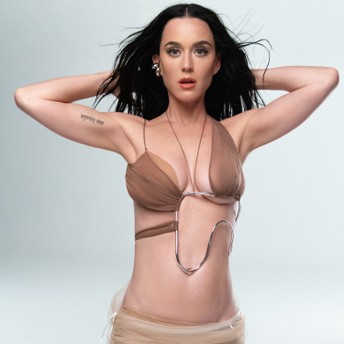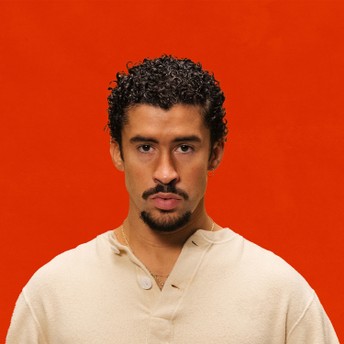Music News
Page: 79
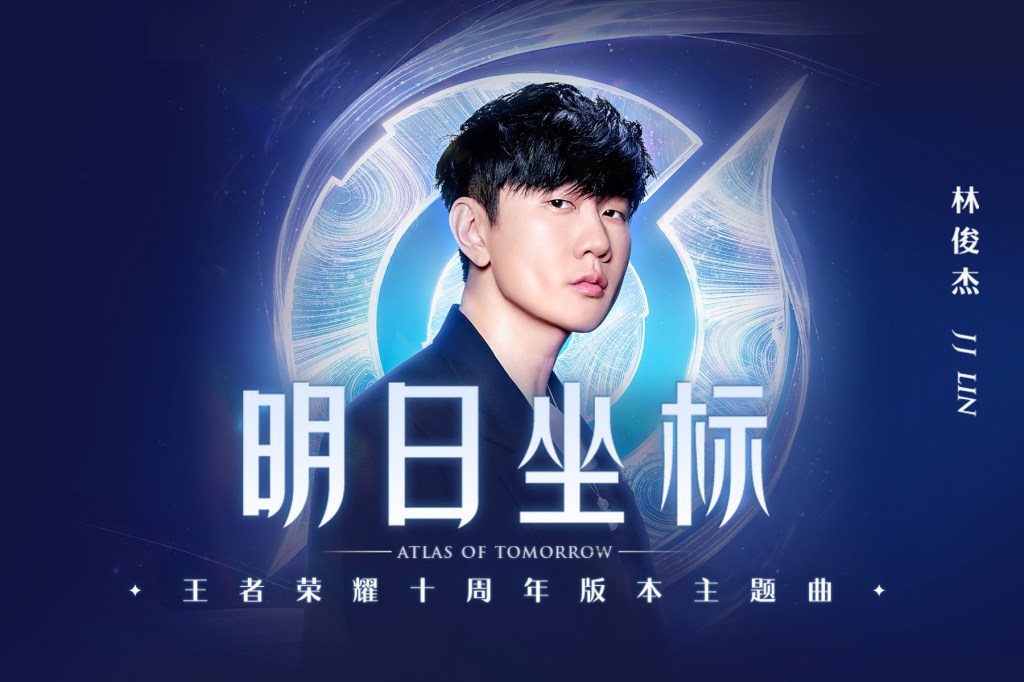
Trending on Billboard
Global gaming powerhouse Honor of Kings has dropped its 10th-anniversary theme song “Atlas of Tomorrow,” now streaming across major platforms including Tencent Music Entertainment’s QQ Music, Kugou and Kuwo, alongside Apple Music, Spotify and KKBOX. The track shot to No. 1 across multiple charts upon release, cementing itself as the latest blockbuster crossover between Mandopop and globally influential game IPs.
“Atlas of Tomorrow” boasts composition and vocals by JJ Lin, brand ambassador of Honor of Kings, Mandopop heavyweight and two-time Golden Melody Awards winner for best male singer, and lyrics by Kevin Yi, hitmaker and senior music planner. JJ Lin describes the track as “dedicated to every dreamer still writing their future chapters, letting music guide you to the stories we’re meant to live.” The track shot to No. 1 on QQ Music, Kugou and other major Chinese streaming charts upon its release. As of publication, it has racked up more than 2 million saves across platforms, generated 70-plus trending topics on social media, and amassed more than 600 million views, shattering multiple records for gaming music.
Notably, the impact of “Atlas of Tomorrow” has expanded from the realms of music and gaming into an online cultural co-creation movement spanning multiple regions. Over 280 tourism boards across mainland China, from Beijing to Guizhou to Zhejiang, have spontaneously paired the track as a soundtrack with local landmarks and cityscapes for videos, triggering a viral relay across short-video platforms.
“Atlas of Tomorrow” centers on the theme of “Gathering for Journey.” The profound resonance of its melody and lyrics stems from its ability to encapsulate a decade’s worth of emotional memories and energy accumulated within Honor of Kings, a beloved national IP. Therefore, the work transcends mere melody, becoming players’ response to their youth and stories. The track’s overwhelming reception among gamers and music fans worldwide following its release reflects both the song’s exceptional craftsmanship and emotional depth, as well as the formidable cultural influence and crossover appeal that Honor of Kings commands.
Through this partnership, TME empowers the gaming IP to achieve multidimensional expression across visuals, gameplay and audio via content co-creation and integrated campaigns. The collaboration underscores music’s expanding cultural role and reach within gaming ecosystems. Moving forward, TME remains committed to deepening strategic alliances with globally influential cultural IPs, promoting music’s unique power across diverse cultural content ecosystems and helping high-quality original voices reach a wider international audience.
Trending on Billboard
Cardi B and Stefon Diggs are expecting their first child together any day now, and according to the football player, it’s a bouncing baby boy.
Diggs revealed the sex of their soon-to-be bundle of joy while speaking to People at the 2025 CFDA Fashion Awards on Monday (Nov. 3). “It’s a boy,” he said. “That’s enough for me.”
He went on to say that he’s excited to impart his athleticism on his son. “I can’t wait to make him do push-ups and sit-ups and run around,” Diggs said.
At another point in the night, the New England Patriots player revealed that Baby Diggs will be making his grand entrance shortly. “It’s supposed to happen real soon,” he told Extra at the same event. “So, wish us both luck.”
The rapper and Diggs first went public with their romance earlier this year, stepping out together on Valentine’s Day. The following April, they were spotted at Coachella together.
They revealed in September that they are expecting a baby, with Cardi telling CBS Mornings, “I’m excited … I’m doing all this work while I’m creating a baby, and me and my man, we’re very supportive of each other.”
That same month, Cardi dropped new album Am I the Drama?, which debuted at No. 1 on the Billboard 200. Staying true to the LP’s title, the Grammy winner’s pregnancy hasn’t been without its fair share of drama, with Cardi continuing to publicly spar with estranged husband Offset and accusing him of holding up their divorce proceedings in recent months.
The Migos star — who shares three children with Cardi — later appeared to lash out at her on a new song released at the end of October. “How the f—k you leave Jordan for Rodman/ You a fool if you think that I’m hurt/ You ain’t happy, I know how it work,” he raps on “No Sweat.” “How you married and still giving birth?/ Get some help, b—h, you going berserk.”
Cardi, however, said afterward that she has no time for any “dark energy” being sent her way during pregnancy. “One thing I notice, I swear to God, and it’s so real … anybody that messes with me while I’m at my most vulnerable — and my most vulnerable is always when I’m pregnant — God always punishes them,” she said on X Spaces. “Two, three years might pass … and God goes and punish them the worst way.”
Trending on Billboard
Katy Perry is bruised and battered in a new promo shot for what appears to be her upcoming single, “Bandaids.” The singer who is just a month from winding down her global Lifetimes tour, posted a cryptic image on Tuesday morning (Nov. 4) featuring a somber photo of her face, seemingly worse for wear as evidenced by scratches and bruises on her forehead, cheek, lip and nose.
Explore
See latest videos, charts and news
With no further explanation, the image also finds her stone-cold visage bracketed by her name and the single’s title, with the caption teasing a Thursday (Nov. 6) release. At press time no additional information was available on the song, whether it’s a one-off or attached to a new album and a spokesperson for Perry had not returned Billboard‘s request for comment.
Perry released her uptempo, dance-focused seventh studio album, 143, last September, which debuted at No. 6 on the Billboard 200 album chart. The album, highlighted by the singer’s reconnect with producer Dr. Luke, as well as songs produced and co-written by pop savants Max Martin and Stargate, featured the singles “Woman’s World — which peaked at No. 63 on the Billboard Hot 100 singles chart — as well as “Lifetimes” and “I’m His, He’s Mine” featuring Doechii.
Perry launched her Lifetimes tour in support of 143 in Mexico City on April 23 and she’s slated to play the first of two shows at Accor Arena in Paris on Tuesday night, followed by shows in Spain, China and Japan, before winding down on Dec. 7 with a gig at Etihad Park in Abu Dhabi. The singer will then take a break and be back on the road next June for a series of festival shows Chile, Brazil, Germany, Madrid, France and Italy.
Following her split from longtime love actor Orlando Bloom in early July after dating on and off for nearly nine years — the couple share four-year-old daughter Daisy Dove — Perry, 41, made her first public appearance with new beau, former Canadian prime minister Justin Trudeau, on Oct. 25. The couple were seen celebrating the singer’s 41st birthday with a date night at the Crazy Horse Paris, leaving hand-in-hand.
The confirmation of their relationship came two weeks after Perry joked about dating rumors during her Oct. 13 London concert, reacting to a fan sign that read, “Katy Perry, will you marry me?”
“You heard I was single? That’s interesting,” Perry responded. “You know you really should have asked me about 48 hours ago.” Prior to that, photos had surfaced of Perry and Trudeau kissing on a yacht after they were previously spotted dining together in Canada shortly after Trudeau was spotted at Katy’s show in Montreal in July.
Trending on Billboard
A$AP Rocky is enjoying life as a father of three, and being a girl dad for the first time after Rihanna gave birth to Rocki Irish Mayers in September.
Rocky, who was honored with the Fashion Icon Award at the CFDA Fashion Awards on Monday night (Nov. 3), chatted with Extra’s Mona Kosar Abdi on the red carpet about his new bundle of joy. “Yo, being a girl dad is amazing,” Rocky said with a smile. “I mean, check me out — I’m glowing.”
The Harlem native also spoke with Entertainment Tonight, who reminded Rocky that Rihanna actually won this exact award 11 years prior in 2014, making Rocky and RiRi the first couple to win. “It means a lot, 11 is my lucky number. Eleven years later, look at us,” he said.
Rihanna walked the carpet with her boo, and Rocky continued to rave about his baby girl: “Rocki is cuter than ever. She’s my baby twin, so it’s amazing. I’m happy to be a girl dad at this point.”
It was a busy night at the “Oscars of fashion” on Monday, which saw Teyana Taylor play host of the CFDA Fashion Awards. Condé Nast chief content officer Anna Wintour presented Rocky with his Fashion Icon Award.
“[Rocky’s] joining us here tonight two months after the birth of his third child named Rocki. Seeing A$AP Rocky, the devoted father, makes it clear how much family means to him and now we are all welcoming him into ours,” she said, per the Associated Press.
2025 has been a wild ride for Rocky, even without the release of his long-awaited Don’t Be Dumb album. He was found not guilty in his felony shooting case involving former associate A$AP Relli in February.
Rocky and RiRi welcomed Rocki into the world in September, as their daughter joins big brothers RZA and Riot.
Watch the rapper’s interviews at the CFDA Fashion Awards below:
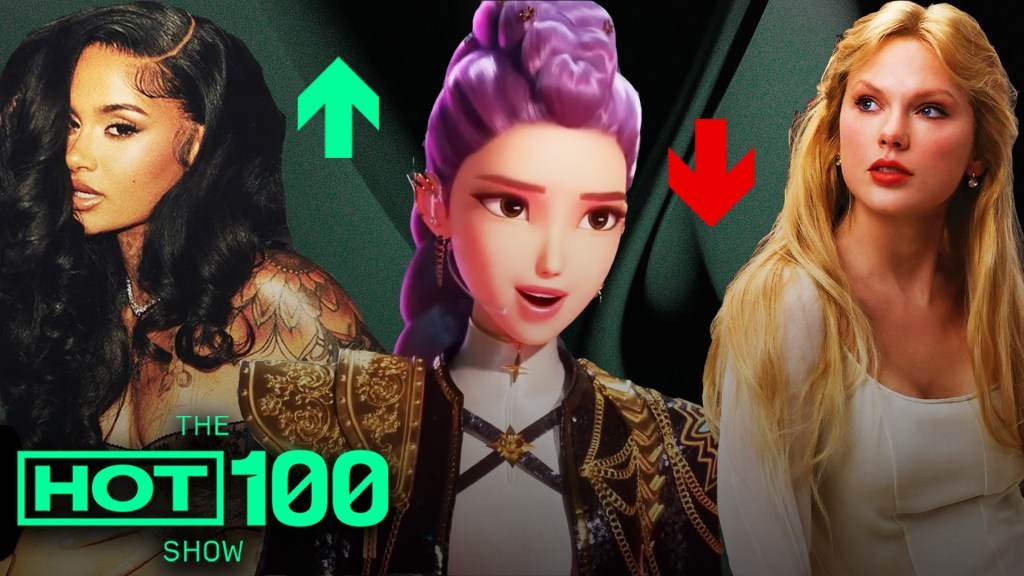
Trending on Billboard
Kehlani makes her top 10 debut with “Folded,” while Justin Bieber’s “Daisies” and Olivia Dean’s “Man I Need” continue to rise. Billboard‘s chart experts break down the new contender and whether Mariah Carey will come flying in to No. 1 anytime soon. We also took to the streets of L.A. and asked fans what they thought about the top 10 for this week.
Tetris Kelly: The battle between “Golden” and Taylor Swift stays tight as a new contender enters the top 10. It’s time, well, according to Mariah Carey and KATSEYE, but maybe not quite yet on the charts. More on that moment a little bit later. But for now, let’s jump into the top 10. This is the Billboard Hot 100 top 10 for the week dated Nov. 8. Still at 10 is Leon Thomas with “Mutt.”
Guest 1: So, “Mutt,” man, I feel like it’s so, like, relatable to our culture. I love it. It’s got, like, a lot of flavor in it. And the women, I love the women. So it gets you, you know, it gets you in there.
Tetris Kelly: Morgan also stays at No. 9.
Guest 2: I mean, I live in Texas, so everyone’s obsessed with Morgan Wallen. I kind of stay away from what everyone’s obsessed with.
Guest 3: I don’t listen to him. I’ve never been a country girl, but I know he’s big. I don’t actually think I’ve ever listened to a single song by him.
Guest 4: I never even heard of him. You wilding because I don’t know Morgan.
Tetris Kelly: “Elizabeth Taylor” falls to eight.
Guest 4: Music swiftly goes right by me. Oh, hey, she cute. Though, I bet if I heard it, I probably would like it, though.
Tetris Kelly: So not a lot of movement in the bottom of the chart, but I am happy to see Leon Thomas still hanging in there. How we feeling about the chart this week, guys?
Delisa Shannon: I mean, y’all know this, I love me some Leon Thomas, so to see him holding on, I mean, it’s just truly a testament to really pushing a song. I think that’s what we’ve seen time and time again on these charts, where we see a song that not only that the artist is really strong behind, but their fandom is really strong behind.
Keep watching for more!
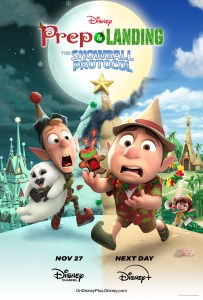
Trending on Billboard The Prep & Landing story continues this holiday season, picking up with a brand-new animated special about elite elf duo Wayne and Lanny in Prep & Landing: The Snowball Protocol, and Billboard Family is exclusively premiering the tinsel-topped trailer below. The fourth special in the Emmy-winning franchise — and the first in […]
Trending on Billboard
Bad Bunny, Karol G, CA7RIEL & Paco Amoroso, Fuerza Regida, Marco Antonio Solís, and Chuwi have been added to the 2025 Latin Grammy Awards lineup, The Latin Recording Academy announced on Tuesday (Nov. 4).
Explore
See latest videos, charts and news
The new wave of performers join previously confirmed artists Pepe Aguilar, Aitana, Rauw Alejandro, Edgar Barrera, Ivan Cornejo, DannyLux, Gloria Estefan, Joaquina, Kakalo, Carín León, Liniker, Morat, Christian Nodal, Los Tigres del Norte, Nathy Peluso, Elena Rose, Alejandro Sanz, Grupo Frontera, Kacey Musgraves, Carlos Santana and the 2025 Person of the Year, Raphael.
Bad Bunny leads this year’s nominations, receiving 12 nods including for album of the year with Debí Tirar Más Fotos and double mentions in record of the year and song of the year, with “Baile Inolvidable” and “DTMF.” The Puerto Rican artist is closely followed by Mexican hitmaker Edgar Barrera and Argentine duo CA7RIEL & Paco Amoroso, each with 10 nominations.
In addition to Raphael being honored as the 2025 Person of the Year, The Latin Recording Academy’s special awards recipients this year include Afro-Peruvian artist Susana Baca, Spanish rock icon Enrique Bunbury, Brazilian musician Ivan Lins and Mexican vocal trio Pandora. Meanwhile, Puerto Rican tropical star Olga Tañón will be honored with the Lifetime Achievement Award and Eric Schilling with the Trustees Award.
The 26th Annual Latin Grammy Awards will be broadcast live at 8 p.m. ET/PT on Nov. 13 from Las Vegas via TelevisaUnivision platforms. Prior to the live broadcast, the Latin Grammy Premiere, a non-televised event where the majority of winners are announced, will take place.

Trending on Billboard Halsey might be welcoming fans back to the badlands, but that doesn’t mean people are allowed to have bad manners at their shows. At the Nov. 3 show in Boston, a man in the audience interrupted the singer as she was speaking by telling her to “stop talking and play,” something Halsey […]
Trending on Billboard
Max Chambers charged into the Knockout Round on The Voice on Monday night (Nov. 3) and proceeded to blow the coaches away with his high-energy, preternaturally soulful cover of Stevie Wonder’s 1972 classic “Don’t You Worry ‘Bout a Thing.” The 14-year-old Shreveport, Louisiana student came in to do battle with fellow Team Bublé member Max Cooper III, who also held his own with a cover of Djo’s “End of Beginning.”
Explore
See latest videos, charts and news
But Chambers’ poised, powerful performance had Snoop Dogg jumping out of his seat, howling and singing along, as the teen swung and smiled his way through the soul-funk jam with such ease, confidence and swagger that he earned the show’s first-ever Mic Drop award.
The new wrinkle introduced for season 28 of the show — there are no more steals or saves left in the knockout rounds — allows each coach to select one of their acts for the honor bestowed on a performance that is simply undeniable. Even better, after the Droppers are chosen, fans at home get to vote on which one of them will represent the show at the Jan. 1 Rose Parade; voting for the Mic Drop winner will take place on the Nov. 24th episode.
“Max, for my money, is a frontrunner to win The Voice this year,” said coach Bublé. “He could be the youngest winner in Voice history. I really think that Max Chambers could be the reason I am a three-peat winner.” After hitting his Mic Drop button, Bublé added, “I was so excited. I felt like I was doing millions of people a favor. I do hope you’ll vote for him because I do feel he deserves to be there.”
Snoop’s praise climbed even higher. “Precious lord, take my hand, lead me on and let me stand! I got to take my glasses off!…A star is born, man,” the Doggfather enthused.
So far, Team Reba’s Aubrey Nicole, Team Niall’s Ava Nat and Team Snoop’s Ralph Edwards have all won their Knockout rounds so far and are moving on to the playoffs. The Voice airs on Monday night at 8 p.m. ET on NBC and streams the next day on Peacock.
Watch Chambers’ performance below.
Trending on Billboard
After People announced Wicked star Jonathan Bailey as its 2025 Sexiest Man Alive, the world seemed to have one overwhelming reaction: “We couldn’t be happier, thank goodness.”
That reaction spilled over to Bailey’s Wicked castmates, who appeared in a video on the film’s social media accounts celebrating their Fiyero nabbing the coveted title. In the clip, stars Cynthia Erivo, Ariana Grande, Jeff Goldblum, Bowen Yang, Ethan Slater, Marissa Bode and director Jon M. Chu all appeared wearing sweatshirts emblazoned with steamy photos from their fellow actor’s cover shoot for the magazine.
Each castmate offered their congratulations to Bailey, while occasionally throwing in a few jokes. “He’s the sexiest man not only on this planet, but in the solar system, in the universe, in any multiverse,” Goldblum said in the clip while showing off his sweatshirt emblazoned with Bailey’s face.
Yang jumped in, appreciating his photo of Bailey in a black jumpsuit hoisting himself up on a set of gymnastic rings. “Looks best in a singlet while doing gymnastics,” he quipped. Bode simply added, “Clearly, look at those abs.”
But the cast also sent sweet messages to Bailey, with Grande praising the actor’s interior as equally sexy, calling him “the kindest and the most brilliant and beautiful inside as well.” Erivo concurred, adding that “now the world knows what I’ve known all along.”
Erivo also celebrated with a comment on the actor and People‘s joint announcement post on Instagram. “YEEEEESSSSSSS!!!!! Now the world knows what I’ve known all along 😏,” she gushed. “I LOVE YOU! CONGRATULATIONS!!!”
Bailey’s selection was not only celebrated, but also historic. On the magazine’s 40th anniversary of its Sexiest Man Alive issue, Bailey becomes the first openly gay man to receive the title. In his cover story, Bailey spoke about his work on The Shameless Fund, a charity he founded to help fund non-profits fighting back against anti-LGBTQ+ laws around the world. “There’s so many people that want to do brilliant stuff who feel like they can’t, and I know the LGBT sector is under immense threat at the moment,” he said. “So it’s been amazing to meet people who have the expertise and see potential that I could have only dreamed of.”
Check out the Wicked cast’s reaction to Bailey’s new title below:

 State Champ Radio
State Champ Radio 